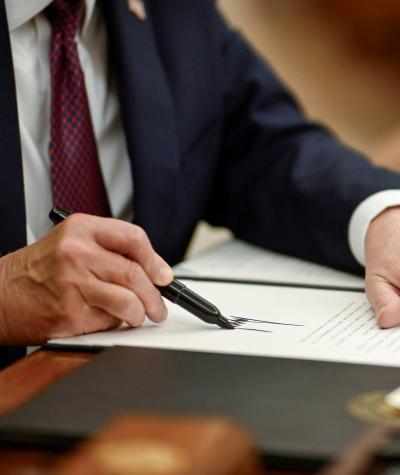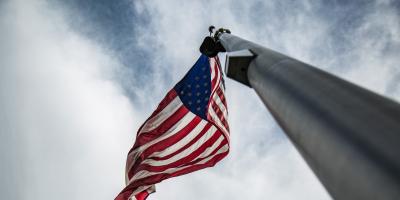Although executive orders have been used by presidents as far back as George Washington, they have become the subject of much discussion since the start of the second Trump administration.
Immediately upon reassuming office, Trump issued a flurry of executive orders that could be consequential for millions of Americans.
But the president is not a king or a dictator, and executive orders are not a blank check for the president to exercise his will without constitutional checks and balances.
How Executive Orders Work (and Are Challenged)
Executive orders (or EOs) are presidential instructions that direct executive branch agencies and staff to take (or stop taking) specific actions.
Although the U.S. Constitution does not mention executive orders, a president’s authority to issue them is generally accepted as part of their power as our country’s executive.
Any president is permitted to amend, repeal or replace any previous executive order.
Oftentimes, presidents use executive orders to kick off their pivotal “first 100 days” in office with a show of power and willingness to make good on campaign promises. But executive orders are not always able to deliver an easy win for administrations.
To be permissible and have legal effect, an executive order must be rooted in one of the president’s powers as outlined in the Constitution or in a law passed by Congress.
The authority of executive orders is not final. Federal courts can be called on to review an orders’ lawfulness and determine whether it is a valid exercise of the president’s power. No president can issue an order that contradicts or violates the Constitution, federal laws or Americans’ fundamental rights.
Courts have struck down executive orders in many instances — such as in Trump’s first term, when a federal appeals court determined that the Trump administration did not have the authority to issue an executive order withholding federal funding from “sanctuary cities” and upheld Congress’ constitutional power to set the rules for federal grants.
Executive orders have a significant place in the American presidency — but unchecked abuses of this authority could further undermine the rule of law that protects our democratic system of self-governance. Judicial review has been a critical check on preventing this type of presidential overreach.
Troubling Signs for Democracy
On his first day in office, Trump signed more than 20 executive orders, the largest number any president has issued on their Inauguration Day. Many of Trump’s executive orders in the first weeks of his presidency have directly threatened the fundamental principles of our democracy. Among them were:
- “Protecting the Meaning and Value of American Citizenship”
- Purports to end birthright citizenship for certain categories of U.S.-born children and directs federal agencies to not issue documents recognizing U.S. citizenship of children unless at least one parent is either a U.S. citizen or legal permanent resident (excluding those on student, work, or other “temporary visas").
- Birthright citizenship, which is guaranteed by the 14th Amendment to the U.S. Constitution, ensures that all Americans, regardless of who our parents are, have equal rights under the law and the opportunity to make our voices heard.
- "Establishing and Implementing the President’s Department of Government Efficiency"
- Renames the U.S. Digital Service as the “Department of Government Efficiency” (DOGE) with the goal of modernizing federal technology and software, improving interoperability, and enhancing government productivity.
- CLC recently requested records on DOGE to bring transparency to the entity’s authority and make sure it is not being improperly used to secretly advance wealthy special interests in governmental decisions.
- “Restoring Accountability to Policy Influencing Positions Within the Federal Government”
- Reinstates and amends a prior policy (Schedule F) that reclassifies certain civil service policy-related positions for easier removal of underperforming or noncompliant employees.
- This order could politicize the nonpartisan federal workforce and pave the way for thousands of firings of career government employees for perceived disloyalty to the Trump administration or for other politically-motivated reasons.
Additionally, Trump rescinded dozens of Biden-era executive orders, including several that were designed to uplift and protect American’s access to a fair and representative democracy and establish ethics rules for political appointees:
- "Promoting Access to Voting"
- Directed federal agencies to consider how to expand citizens’ opportunities to register to vote and to obtain information about, and participate in, the electoral process.
- "Ensuring a Lawful and Accurate Enumeration and Apportionment Pursuant to the Decennial Census"
- Required the official census count to include all residents regardless of immigration status. An accurate count of each state’s residents helps determine how we allocate seats in the House of Representatives.
- “Ethics Commitments by Executive Branch Personnel”
- Required all presidential appointees to sign an ethics pledge, agreeing to comply with strict ethics rules, including restrictions on former lobbyists who serve in the administration.
Defending the Law at Every Turn
As Campaign Legal Center continues to hold the Trump administration accountable, we’re keeping a close eye on which executive orders constitute presidential overreach and making sure our system of checks and balances upholds the rule of law.
If the president exceeds his lawful authority or violates the Constitution, the courts will be called on to provide justice.
Legal advocacy groups have already begun to challenge the legal limits of Trump’s executive orders, and a federal judge has temporarily blocked his plan to end birthright citizenship.
Trump’s attempts to make the government less responsive to the American people through executive orders — whether that’s curbing voting access, removing ethics rules, or politicizing the federal civil service — may be a troubling sign of how he plans to govern these next four years.
Presidents will use all avenues available to them, including executive orders, to exercise their political will. Courts must remain ready to perform their constitutional duty and strike down any executive order that undermines the rule of law.
CLC will be a watchful eye to make sure executive orders do not undermine the rule of law or our Constitution. To see what else we’re keeping an eye on, check out our priorities for President Trump’s first 100 days.



